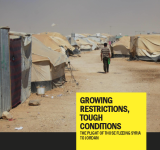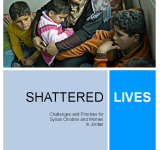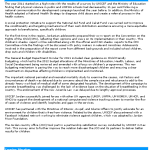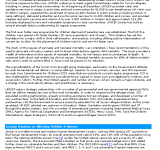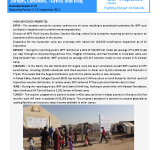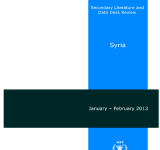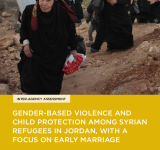يستند مضمون هذا التقرير المتعلق بالأردن إلى حد كبير إلى زيارة بحثية قامت بها منظمة العفو الدولية إلى البلاد في يونيو/حزيران 2013. وقد التقى وفد المنظمة بممثلي السلطات الأردنية ووكالات الأمم المتحدة والوكالات الإنسانية الدولية والمنظمات غير الحكومية والجمعيات الخيرية;; فضلاً عن أكثر من 150 لاجئاً من سوريا في مجتمعات اللجوء والمجتمعات المضيفة. ونشرت منظمة العفو الدولية هذا التقرير بهدف لفت الانتباه إلى الصعوبات التي يواجهها الفارون من سوريا طلباً للسلامة. وفي الوقت الذي يركز فيه التقرير بشكل رئييس على الأوضاع في الأردن;; فإنه يتضمن تحديثا للمعلومات التي كانت المنظمة قد نشرتها في السابق بشأن التحديات التي يواجهها اللالجئون من سوريا في البلدان المجاورة. وقد أمعنت منظمة العفو الدولية النظر في التحديات التي يواجهها اللاجئون في الأردن;; ولا سيما أولئك الذين يقطنون في مخيم الزعتري;; وهو أضخم مخيمات اللاجئين من سوريا في الأردن. وأجرت المنظمة تحقيقاً حول معاناة اللاجئين;; ليس من ظروف المعيشة القاسية في الصحراء فحسب;; وإنما أيضاً من ارتفاع معدلات الجريمة وغيرها من المخاوف الأمنية.
Syrian refugees
With an executive summary on the Syrian refugees situation in Jordan;; the report combines the conclusions of detailed assessments in various areas including as child protection and gender-based violence;; education;; water sanitation and hygiene;; and nutrition and health. It provides a holistic picture of the situation faced by Syrian children and women in Jordan to draw out recommendations for necessary plans of action. Some key findings of the report include growing challenges for water;; sanitation and hygiene situation in Za’atari camp;; several threats to the nutritional status and health of Syrian girls;; boys and women and increasing violence against adolescents. Bringing together the voices of children and women at the camps;; the report examines the situations of Syrian refugees in host communities and refugee camps and finds key recommendations based on them.
The UNICEF Syria Crisis is a series of bi-weekly report that provides a summary of the humanitarian situation in Syria and development of the organization’s projects in the regions including Syria;; Lebanon;; Jordan;; Iraq;; Turkey and Egypt. The report contains an overview to the changing situations and humanitarian needs of the crisis. It focuses on the results and progress of the UNICEF projects in partnership with other local agencies in each country. These projects aim to ensure sustained access to safe water and sanitation;; provide psychosocial support;; vaccination and school supplies for children and support camps and host community schools for increased school enrollment. Relevant figures that summarize and evaluate the development of ongoing programmes can also be found in the report.
The 2011 annual report provides a comprehensive summary of the ongoing projects by the UNICEF Jordan Country Office (JCO). The programmes and projects include social protection initiatives for the National Aid Fund and Zakat Fund;; national perinatal and neonatal mortality study and development of nationwide computerized violence tracking system. . The analysis of the report is based on the progress and assessment of the JCO’s projects in partnership with other organizations in relevant fields including the Ministries of Interior;; Awqaf and Islamic Affairs and other UN agencies (UNDP;; UNFPA;; UNWOMEN;; UNHCR and WHO). The report specifies the organization’s methodology in collecting data and evidence and monitoring mechanisms to track and assess programme progress. In evaluating the development of ongoing projects;; the report summarizes future work plans and examines critical factors and constraints in each project.
The annual report summarizes and evaluates the humanitarian and developmental assistance of the UNICEF Jordan Country Office (JCO) in 2012. The report also includes evaluation of the ongoing projects such as providing humanitarian aid for Syrian refugees in camps and host communities;; establishing foster care programme for children deprived of parental care;; and supporting advocacy work on children’s rights to education and women empowerment. The analysis of the report is based on the progress and assessment of the JCO’s projects in partnership with other organizations in relevant fields. In the report;; the limited capacity and number of social workers and lack of technical support from the government in budgeting and social policy reforms are identified as major obstacles.
During the reporting period;; World Food Programme (WFP) distributed a total of 340;;000 hot meals (an average of 52;;000 meals per day) through its implementing partners TUA;; Thaghar Al Madina;; and Radi Shedifat in Al Za'atari camp and King Abdullah Park. In addition;; WFP provided an average of 4;;213 welcome meals to new arrivals in Al Za'atari Camp. The following report details such endeavors.
The purpose of this desk review is to uncover the food security and nutrition information available on the three target countries;; to advise WFP on the absence of any relevant information that would prevent a comprehensive evaluation of refugee food security status;; and to provide guidance on areas for primary data collection during the March 2013 Joint Assessment Mission (JAM).
The report aims to address the particular needs and cultural dynamics of Syrian refugees residing in Jordan;; especially with regards gender-based violence and child protection issues. It presents a comprehensive range of perspectives from urban Syrian refugees and local Jordanian decision makers in government;; community-based organizations and the religious and education sectors. The assessment of this report is based on data collected through three methodologies including questionnaire survey to refugees outside the Za’atari refugee camp;; focus group discussions in regions across Jordan and in-depth interviews. Key findings of the report are 1. The rates of early marriage are high;; 2. A significant percentage of children contribute to the household’s income and 3. Restrictions on women and girls’ mobility constrain their participation in social and economic activities and access to basic services. The report recommends measures to prevent acts of sexual exploitation and abuse and ensure the needs of the most vulnerable members of the Syrian refugee population in the cities.
